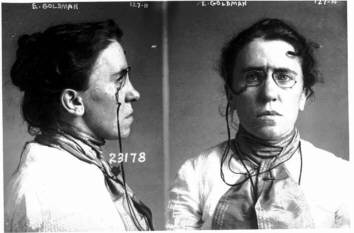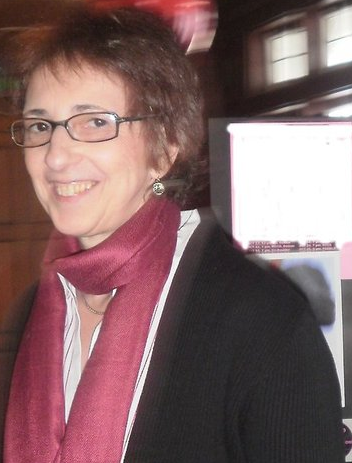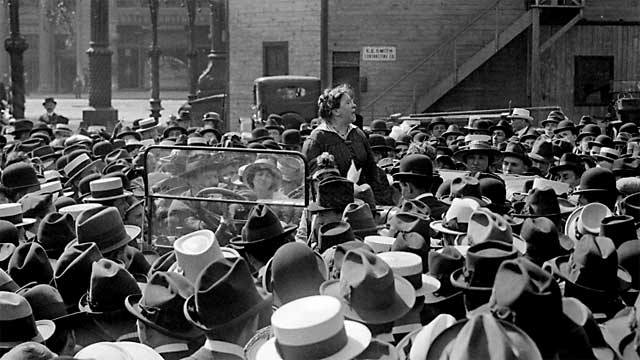Blog Archive
Emma Goldman’s Legacy: An Interview with Activist Cynthia Cooper
“Hers was the sensibility not of the intellectual but of the artist; and she performed like an artist, dramatizing for others what they could hardly articulate for themselves.” (Historian Vivian Gornick on Emma Goldman)
Today, Emma Goldman is most recognized by the general public as a “dangerous person.” I find that most visitors I speak to know of her mostly by name only, or because of her role as an anarchist, her involvement with people like Alexander Berkman, the wrongful implication of her in an assassination attempt on President William McKinley, or her deportation in 1919. But I find, time and again, that very little of her legacy is recognized.
Emma Goldman laid the groundwork for the daily lives that women live in the 21st century, fighting for the recognition of women’s health issues, birth control and worker’s rights, and focusing on the rights of women to be recognized as intellectual personalities and not sexual property. Today, women continue the struggle, finding new creative ways to discuss the systemic and social setbacks that we culturally experience. One of these creative women is Cynthia Cooper, an activist and New York City playwright who has focused her art on involving women in their healthcare and legal choices.
Cindy, what first piqued your interest in the women’s movement? When did you first get involved?
I think I first became involved in the women’s movement as a girl – although, obviously, I didn’t have the language for it. I recall asking, again and again, why there weren’t more women authors of the books in school. I was perplexed that boys had more sports opportunities. And I also stood up for boys – I protested in junior high when a boy in the class was punished more severely than me when both of us were talking.
I think Emma Goldman’s spirited view of life is what people most remember – “If I can’t dance, then I don’t want this revolution.”
Why did you choose to use theater and other performance based art to share your viewpoints?
Theater and performance art have such immense capacity to open hearts and minds. They allow transformation. I didn’t come to theater or performance first. I worked as a journalist, studied and practiced law. But as “backlash” to the women’s liberation movement set in, I became more and more convinced that laws alone would not protect our rights. Theater and performance art can reach beyond a fact sheet and influence people in powerful ways, outside of the mainstream policy corridors, and help them move to action. Arlene Goldbard, an arts theorist, calls this “the culture of possibility” – something especially needed now when the issues can become overwhelming.
What do you think some of the most pressing issues for women are today?
Distraction, overload and paralysis are the most pressing issues for women today. So many people are busy trying to get by or keep up. Or they only become engaged in a fake world of entertainment and celebrity. When that happens, they don’t have an opportunity to shape decisions of the times. Sadly, other forces are willing to take advantage of that disengagement. As Emma Goldman said, “Let us not overlook vital things, because of the bulk of trifles confronting us.”
Many “settled” issues have come back into play. Reactionaries who want to push back our rights are a minority, but they have managed to co-opt politics and to box in our rights. It’s easy to do nothing if we aren’t aroused – something Emma Goldman was very good at doing.
Many of the rights that we’ve taken for granted for the past 20-100 years are being undermined – sometimes in quiet ways that move us back an inch or two, and sometimes a mile. Challenges to bodily integrity – reproductive freedom, access to abortion, contraception, child rearing assistance, sexual expression and the right to privacy. Attacks on cultural dignity, environmental health, diversity, economic security, freedom from gender violence, equal representation in public leadership, parity in the arts, media and private sector, and even on voting. There are forces working actively to encroach on women’s human rights.
Neglect your rights and they will go away. Emma Goldman once said, “People have only as much liberty as they have the intelligence to want and the courage to take.”
During the time period of your work, are you surprised about anything that has changed? What hasn’t changed?
Birth control is now under attack in the U.S. Supreme Court because businesses said that they shouldn’t have to be part of a health care system that covers contraception for women as preventive care. Some people opposed to birth control made the same arguments that people heard in Emma Goldman’s day; they’ve filed briefs saying that birth control is immoral or against nature, that it harms women, that it undermines marriage and is “unwomanly.” Since 99% of American women have used birth control at some time, it seems that the past is truly whapping us.
What are some of the new challenges that women like Emma Goldman would be discussing today?
Emma Goldman would fit right into the zeitgeist today. She had a big picture view of rights and freedom, and was interested in and activated on many issues. Women today, especially young women and people of color, are reclaiming that big picture and connecting the dots on issues in powerful ways. (The academically inclined call this “intersectional.”)
People see that our rights can’t be isolated and protected in little pods – the same thing that Emma Goldman understood. People’s lives and communities are not touched by a single right or need – but by a vast array. Underpayment in labor affects women’s ability to live full and free lives, just as lack of access to birth control or education means that women will lead diminished lives.
Plus, Emma Goldman understood, as people should today, that you can dance — you can enjoy art and love and life — and you can still fight for women’s rights and human rights. The important thing is not to give up. “The free expression of the hopes and aspirations of a people is the greatest and only safety in a sane society,” she once said.
Thank you Cynthia!
The Tenement Talk, “Emma Goldman’s Legacy” is Wednesday April 9th at 6:30PM. More information here.
If you’d like to see Cynthia in action, check out the Reproductive Justice Walking Tour on June 7, 2014, 1 pm, which will include information and a short performance about Emma Goldman.
– Posted by Emily Gallagher



